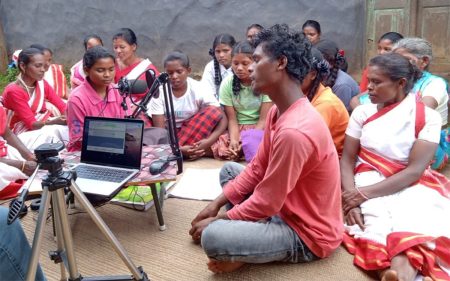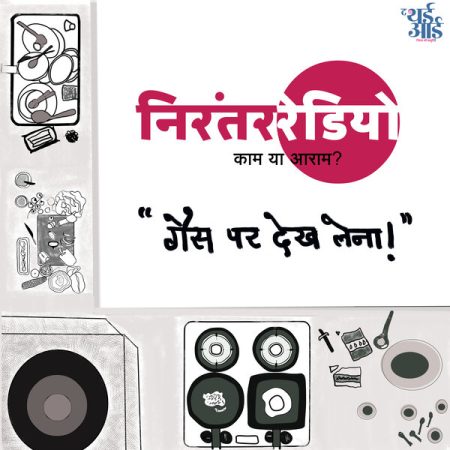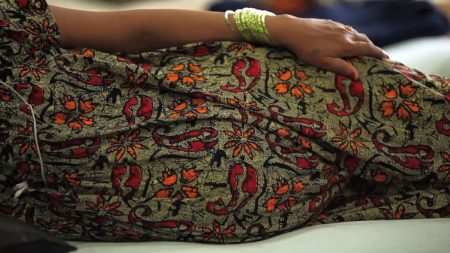The Third Eye worked with 12 caseworkers in rural and small town Uttar Pradesh, and through a process that included immersive writing, theatre-based pedagogies and year long workshops, the caseworkers became the lexicographers of The Caseworkers’ Dictionary of Violence.
It was a Sunday.
Today, I have to go and visit my in-laws house. My son, who is 11, got ready to go with me. The kachcha roads here do not invite an easy means of transport, and so, both of us walked.Questions were rising and falling in my mind, like waves in the sea. The blaring sound of a motorbike horn shook me out of my thoughts. I held my son’s hand and we moved towards the side of the road. After a while, an autorickshaw came along. When I hailed it, the driver refused to stop. He shouted while passing us by, “This road is full of potholes. I am afraid that an overloading of passengers will damage my auto.”
His words angered me. Did he not think of my little boy having to walk on foot? I retorted, “You are ready to give high and mighty people a ride for free — then your auto is working just fine!” Looking at this fuss, my son asked me, “Mummy, will there be no more autos coming along?” “No, there won’t be,” I said. “This one must have been pre-booked. The road is in shambles. Even if there are autos, people don’t pay the fare.”
My son’s curiosity piqued. “Mummy, why don’t people pay the autowalla? Do they not have money?” I replied, “They do have money. God knows why they do not pay.” He persisted, but I tried to waive it off. “Oh, forget it,” I said. But he was adamant. “Mummy, why won’t you tell me — why do people not pay the fare?”
I gave in. “Look, the Thakurs in our village are dabangg — insolent and entitled. Instead of paying these drivers, they thrash and threaten them. They tell them if they want to drive an auto or a taxi in this locality, they will have to let them ride for free. This is why you do not see any autos around here.”
His next question was whether these Thakurs carry any guns with them. I told him that I do not know. I decided I won’t discuss this any further with him. He is just a child, I thought. I did not want him to get any wrong ideas; I wanted to shield him from all of this.
Pointing towards the pond in our path, I tried to distract him. “Look at this pond, how full, how beautiful it looks!” But he held fast to his questions. “Mummy, you buy me a huge gun,” he said. “I will get rid of those dabanggs, because these are the people papa keeps company with, no? This is why he cusses and gets into fights.”
I tried to make him understand that those people are nasty. “Do not become like them. You should study a lot. Do something good when you grow up,” I told him.
The moment I reached the village, I was greeted by a group of women who jeered at me, “It has been raining, and the village is rife with damp mud and mire. What was so important that you had to come here on foot?” I gave an equally cutting reply. “It is my house and I can come and go as I please. It’s not like I need permission to visit my own place.”
The chachi from the neighbouring house said, “Do you not feel scared of travelling alone? I do not go anywhere without my husband,” while pretending to joke. “It seems that chacha is scared of chachi running off somewhere! My husband doesn’t have to worry about that.” This conversation was filling me with an inexpressible annoyance.
On reaching home, my mother-in-law opened the door for me. Turning away, she asked, “Do you know where he is? He didn’t even call.”
“Well, how would I know; he doesn’t call me either,” I said, heading straight to my room. I poured myself a glass of water, settled down in a corner and stared at my surroundings. It had only been four months since I had left this house. And yet it felt like I hadn’t visited for years.
All the memories of the past 10 years came rushing in. Memories of everything that had happened to me in this room. How I was never allowed to use a phone. Whenever I had some work and asked for the mobile phone, he would snap at me and say, “What is it that you do during the day anyway, that you have to work at night?” So, I would make a compromise with myself and say, “Okay, I will do this tomorrow morning”
Every time I tried to ask for the mobile phone, my husband would threaten to smash it to pieces. My kids would advise me to ask for the phone in the morning, so that their father won’t start a fight.
This house saw me wake up at 4 am and work through an endless list of chores, while my husband slept on. It seemed impossible to get through the nights when my husband would come back drunk. If we ever had relatives over, I would spend my nights anxious about whether I would be able to finish all the chores in time before getting ready for work the next day.
Days spent at work would be full of distress. I would be riddled with thoughts like “I wonder where he is right now. I hope he does not show up drunk at home; that frightens the kids.”
It was shocking to realise just how many things I had been enduring, and just how many compromises I had made.
Thinking about all of this, I was plagued with anxiety.
I could never confide in anyone back then, and so when I decided to live on my own, most people were unaware of my decision. My husband may come and go, but I stay away from my in-laws, outside Fatehpur, with my children.
I do not tell anyone that I no longer live with my husband. If they were to get to know, who knows what they would think of it?
I left the house and started walking towards the fields. On reaching there, I sat under the Mahua tree. I began wondering, how long will this continue to happen to me? In the last 10 years, I have come to love this tree intensely. It has called to me like my dearest friend would, telling me to bare it all. My gaze fixed itself at the branches, or on the shimmering leaves. Under its shade, as if wrapped in a cool breeze, I felt like I had surrendered my anger and weariness to this tree. While thinking all these thoughts, I noticed that the tree’s shade had grown smaller.
Watching the sun go down, I estimated it must be three in the afternoon. I returned to the house and picked up some essentials – a few clothes for my kids, and some rations. Then, along with my son, I returned to my room at the outskirts of the village. If someone asked, I would tell them I lived there for the sake of my children’s education.
For two whole hours, I rested in my room. Then I got up and began preparations for dinner. My daughter said, “Maa, I want to eat Maggi today.” So I got some from the shop nearby and cooked it. My kids ate it. I did too.
Soon the kids got busy with their books. In the middle of these tasks, I thought about how even though there are no more fights, the burden of responsibilities resting on my shoulders has increased. I was not concerned with these things when my husband was at home: going out to get vegetables and milk, taking care of the fields, or getting wheat ground. I was somewhat removed from such chores.
Living alone, I have a certain peace, but I’m still in society’s gaze. When I stayed with my husband as a married woman, I would make it a point to dress up for work, regardless of tensions at home. But now, I hesitate. Can you ever be sure of whose eyes are on you? The last time he called, my husband told me he was in Surat. He has not returned for three-four months now.
My ruminations lead me back to the mahua tree.
A tree stands strong, irrespective of the movement of seasons. Impermanence is the way of the world; just the way my husband comes and goes.
I remember the leaves stirring. The mahua tree stands strong through winters, summers, and rains. It is not afraid of its leaves falling with the coming of autumn. It waits for the right time. Seasons bring with them their own ups and downs for the tree. Things change.
Perhaps something like this is happening to me. With this thought, I close my eyes.
Translated from the Hindi by Pakhi Pande.





